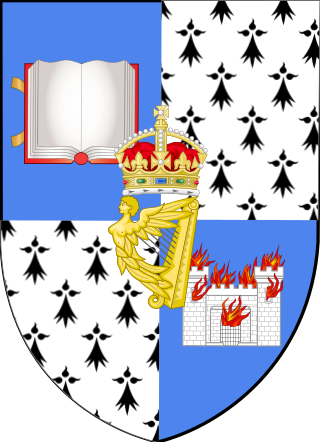Outpatient commitment—also called assisted outpatient treatment (AOT) or community treatment orders (CTO)—refers to a civil court procedure wherein a legal process orders an individual diagnosed with a severe mental disorder to adhere to an outpatient treatment plan designed to prevent further deterioration or recurrence that is harmful to themselves or others.

The University of Dublin, corporately designated as the Chancellor, Doctors and Masters of the University of Dublin, is a research university located in Dublin, Ireland. It is the degree-awarding body for Trinity College Dublin. It was founded in 1592 when Queen Elizabeth I issued a royal charter for Trinity College as "the mother of a university", thereby making it Ireland's oldest operating university. It was modelled after the collegiate universities of Oxford and Cambridge, but unlike these affiliated ancient universities, only one college was ever established; as such, the designations "Trinity College Dublin" and "University of Dublin" are usually synonymous for practical purposes.

Dún Laoghaire–Rathdown is a county in Ireland. It is in the province of Leinster and the Eastern and Midland Region. It is one of three successor counties to County Dublin, which was disestablished in 1994. It is named after the former borough of Dún Laoghaire and the barony of Rathdown. Dún Laoghaire–Rathdown County Council is the local authority for the county. The population of the county was 233,860 at the time of the 2022 census.
The Eighth Amendment of the Constitution Act 1983 was an amendment to the Constitution of Ireland which inserted a subsection recognising "the equal right to life of the pregnant woman and the unborn". Abortion had been subject to criminal penalty in Ireland since at least 1861; the amendment ensured that legislation or judicial interpretation would be restricted to allowing abortion in circumstances where the life of a pregnant woman was at risk. It was approved by referendum on 7 September 1983 and signed into law on 7 October 1983. In 2018, it was repealed by referendum.

Forensic psychiatry is a subspeciality of psychiatry and is related to criminology. It encompasses the interface between law and psychiatry. According to the American Academy of Psychiatry and the Law, it is defined as "a subspecialty of psychiatry in which scientific and clinical expertise is applied in legal contexts involving civil, criminal, correctional, regulatory, or legislative matters, and in specialized clinical consultations in areas such as risk assessment or employment." A forensic psychiatrist provides services – such as determination of competency to stand trial – to a court of law to facilitate the adjudicative process and provide treatment, such as medications and psychotherapy, to criminals.
Health care in Ireland is delivered through public and private healthcare. The public health care system is governed by the Health Act 2004, which established a new body to be responsible for providing health and personal social services to everyone living in Ireland – the Health Service Executive. The new national health service came into being officially on 1 January 2005; however the new structures are currently in the process of being established as the reform programme continues. In addition to the public-sector, there is also a large private healthcare market.

The Mental Health Act 1983 is an Act of the Parliament of the United Kingdom. It covers the reception, care and treatment of mentally disordered people, the management of their property and other related matters, forming part of the mental health law for the people in England and Wales. In particular, it provides the legislation by which people diagnosed with a mental disorder can be detained in a hospital or police custody and have their disorder assessed or treated against their wishes, informally known as "sectioning". Its use is reviewed and regulated by the Care Quality Commission. The Act was significantly amended by the Mental Health Act 2007. A white paper proposing changes to the act was published in 2021 following an independent review of the act by Simon Wessely. It was confirmed on 17 July 2024 that a new mental health act would be legislated for in the forthcoming session of Parliament.
In England, the First-tier Tribunal , more commonly known as the Mental Health Tribunal, is an independent quasi-judicial body established to safeguard the rights of persons subject to the Mental Health Act 1983. It provides for consideration of appeals against the medical detention or forced treatment of a person who was deemed to be suffering from a mental disorder that was associated with a risk to the health or safety of that person or others.
The Irish Blood Transfusion Service (IBTS), or Seirbhís Fuilaistriúcháin na hÉireann in Irish, was established in Ireland as the Blood Transfusion Service Board (BTSB) by the Blood Transfusion Service Board (Establishment) Order, 1965. It took its current name in April 2000 by Statutory Instrument issued by the Minister for Health and Children to whom it is responsible. The Service provides blood and blood products for humans.

Deinstitutionalisation is the process of replacing long-stay psychiatric hospitals with less isolated community mental health services for those diagnosed with a mental disorder or developmental disability. In the 1950's and 1960's, it led to the closure of many psychiatric hospitals, as patients were increasingly cared for at home, in halfway houses, group homes, and clinics, in regular hospitals, or not at all.

James Reilly is an Irish former Fine Gael politician, businessman and medical doctor who served as a Senator from May 2016 to March 2020. He previously served as Acting Minister for Children and Youth Affairs from February to May 2016, Minister for Health from March 2011 to July 2014 and deputy leader of Fine Gael from 2010 to 2017. He was a Teachta Dála (TD) for the Dublin North constituency from 2007 to 2016. He subsequently announced his retirement from politics after he lost his bid for election for his old seat at the 2020 general election.

St. Brendan's Hospital was a psychiatric facility located in the north Dublin suburb of Grangegorman. It formed part of the mental health services of Dublin North East with its catchment area being North West Dublin. It is now the site of a modern mental health facility known as the "Phoenix Care Centre". Since the official opening of the Richmond Lunatic Asylum in 1815 the Grangegorman site has continuously provided institutional facilities for the reception of the mentally ill until the present day. As such the Phoenix Care Centre represents the continuation of the oldest public psychiatric facility in Ireland.

John Hunt is an Irish citizen who was involuntarily detained as a psychiatric patient. The conditions of Hunt's detention have been the subject of a sustained campaign by his former partner and mother of his child Gráinne Humphrys. He was committed as an involuntary psychiatric patient in 2005 and was detained at a secure psychiatric unit at Our Lady's Hospital in Cork until August 2011 when he was transferred to the Central Mental Hospital, Dundrum, Dublin. Until 2010 he was not granted leave for any temporary release from the Cork facility to visit his family. As a result of the campaign of his former partner that year, the Cork hospital allowed Hunt six hours of unsupervised leave every two weeks. Later, following a violent altercation with a psychiatric nurse, this leave was rescinded, and Hunt was transferred to the main Irish forensic psychiatric unit in Dundrum.
The Thirtieth Amendment of the Constitution Bill 2011 was a proposed amendment to the Constitution of Ireland to provide for the Houses of the Oireachtas to conduct full inquiries. The bill was passed by both houses of the Oireachtas, but rejected at a referendum held on 27 October 2011.
The following outline is provided as an overview of and topical guide to psychiatry:

A mental health tribunal is a specialist tribunal (hearing) empowered by law to adjudicate disputes about mental health treatment and detention, primarily by conducting independent reviews of patients diagnosed with mental disorders who are detained in psychiatric hospitals, or under outpatient commitment, and who may be subject to involuntary treatment.
The Protection of Life During Pregnancy Act 2013 was an Act of the Oireachtas which, until 2018, defined the circumstances and processes within which abortion in Ireland could be legally performed. The act gave effect in statutory law to the terms of the Constitution as interpreted by the Supreme Court in the 1992 judgment in the X Case. That judgment allowed for abortion where pregnancy endangers a woman's life, including through a risk of suicide. The provisions relating to suicide had been the most contentious part of the bill. Having passed both Houses of the Oireachtas in July 2013, it was signed into law on 30 July by Michael D. Higgins, the President of Ireland, and commenced on 1 January 2014. The 2013 Act was repealed by the Health Act 2018, which commenced on 1 January 2019.
Involuntary commitment or civil commitment is a legal process through which an individual who is deemed by a qualified agent to have symptoms of severe mental disorder is detained in a psychiatric hospital (inpatient) where they can be treated involuntarily.
The Mental Health Commission is an independent body formed in 2002. Its functions were established by the Mental Health Act 2001 to regulate and inspect mental health services in Ireland. It is the facilitator of the Mental health tribunal system in Ireland. The Commission appoints the panel members which sit on tribunals.








